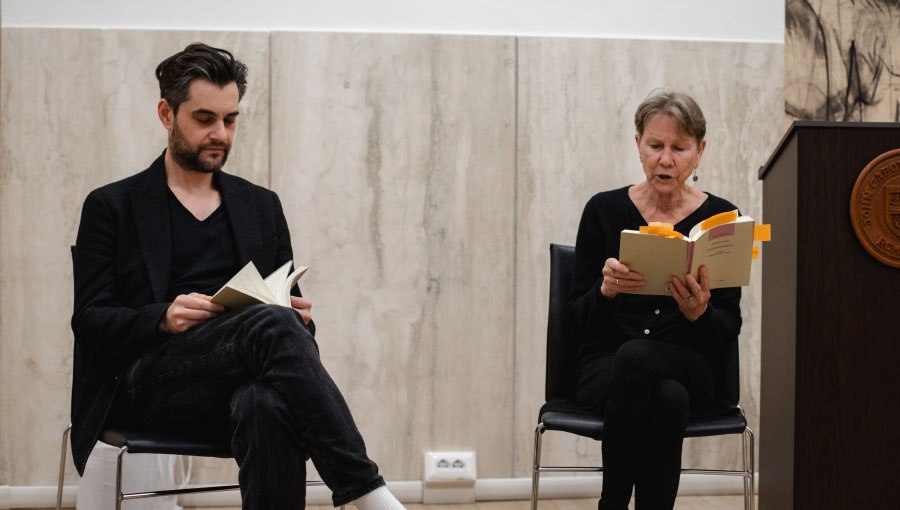Cinema as a Tool to Change Society: Alessio Cremonini on "Sulla mia Pelle"
“Cinema is not just entertainment. It is also a useful tool to bring change to society.”
This is the idea of cinema that inspired Alessio Cremonini in directing Sulla mia pelle (On My Skin), the true story of Stefano Cucchi, a 31-year-old Roman building surveyor who died while in police custody in 2009.
The Department of Modern Languages and Literature and the Department of Communications and Media Studies invited Cremonini to discuss the film, which was screened at JCU on June 24, 2019. John Cabot Professor Federica Capoferri and Italiaidea and DePaul University Professor Carolina Ciampaglia also participated in the discussion.
On the evening of October 15, 2009, Stefano Cucchi was arrested after the police found him in possession of hashish, cocaine, and epilepsy pills. While he was in custody, Stefano was badly beaten up by police officers. Despite his request to see his lawyer, Stefano was appointed one by the court, which decided that he should remain in custody. As Stefano’s conditions continued to worsen, he was moved to a hospital, but one week after his arrest, on October 22, Stefano died due to his injuries.

From left: Professor Federica Capoferri, director Alessio Cremonini, and Professor Carolina Ciampaglia
In the last few years, also in the aftermath of a new and ongoing trial against eight carabinieri, both the media and public opinion have become more and more attentive to the unjust treatment of Stefano’s death and memory. Cremonini wanted to further reverse the negative perception that the public had of Stefano Cucchi. “Sulla Mia Pelle changed Italian public opinion, particularly among older people, and those who were in doubt. It changed the perception of the suffering that Stefano went through,” said Cremonini.
Obtaining the procedural documents, which amounted to over ten thousand pages, was not difficult, says Cremonini. However, it was complicated to study and cross-check the facts, and the research process lasted about a year. But mostly, it was difficult to boil down ten thousand pages to 100 minutes of screen time.
During the making of the movie, Cremonini felt the need to be equidistant from all the parties involved in the story, including Stefano’s family. Stefano’s parents and his sister Ilaria Cucchi were only interviewed regarding his private life. However, Ilaria was the first person to watch Cremonini’s finished product.
Ilaria Cucchi’s role in the film is marginal, even though over the years she has fought tirelessly to bring justice to her brother. The director made this choice because Ilaria has been featured in the media regularly and the public knew her already, whereas not much was known about Stefano. Cremonini added that the story of a heroine was of less interest to him than the story of a victim. “It seemed right to give a voice to someone who no longer has one,” said the director.
The film was bought by Netflix, which allowed it to reach a significantly wider audience because some cinemas refused to screen it. It has been projected in numerous public places in various Italian cities, where many people have had the opportunity to watch it.
Cremonini, who is Catholic, said that the film attempts to combine Stefano’s reality with Italian iconography. Stefano’s story reminded Cremonini of Jesus Christ’s ordeal, with the various police stations Stefano went through representing the Stations of the Cross in Jesus’ path to crucifixion. The director decided to focus on the physical and psychological pain that Stefano was subjected to. The choice not to show his beating on camera also reflected Cremonini’s wish to show its consequences, which led to Stefano’s death.
When asked what viewers should do after watching the film, Cremonini replied that “they should be a bit more worried for the country, and a bit more careful in judging others.”
At the end of the film, the following statement appears:
“Stefano Cucchi was the 148th person to die in prison in 2009. The total number of deaths that year was 172. Doctors and forensic experts have not yet found a scientific explanation they can all agree on for Stefano Cucchi’s death. In their son’s apartment, Stefano Cucchi’s parents found over a kilo of hashish and 130 grams of cocaine, which they reported to the police straight away. In the first trial for Stefano Cucchi’s death, all the defendants were acquitted. After a further investigation by the police prosecutor, on July 10, 2017, the judge for preliminary hearings indicted three Carabinieri for involuntary manslaughter and two others for slander and forgery of public documents. After Stefano’s death, Ilaria Cucchi, and his parents Rita and Giovanni and lawyer Fabio Anselmo embarked on a fight for the truth. In 2017, they set up a non-profit organization in Stefano’s name to defend citizen’s human and civil rights.”





